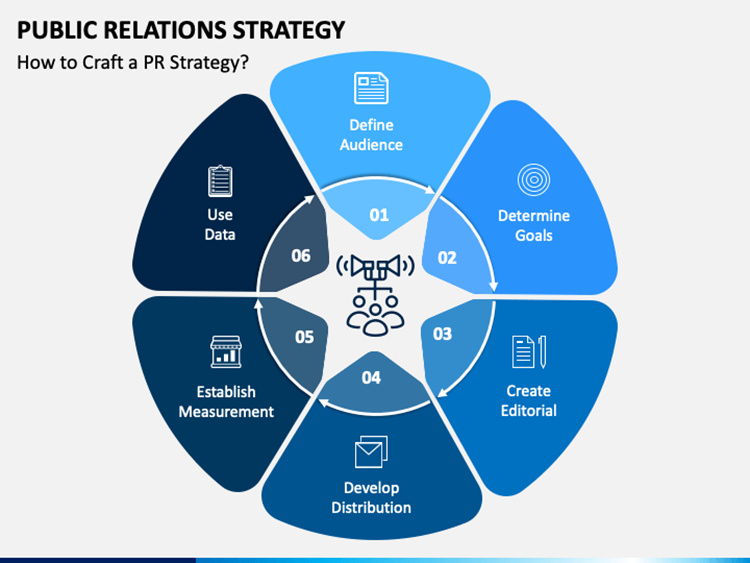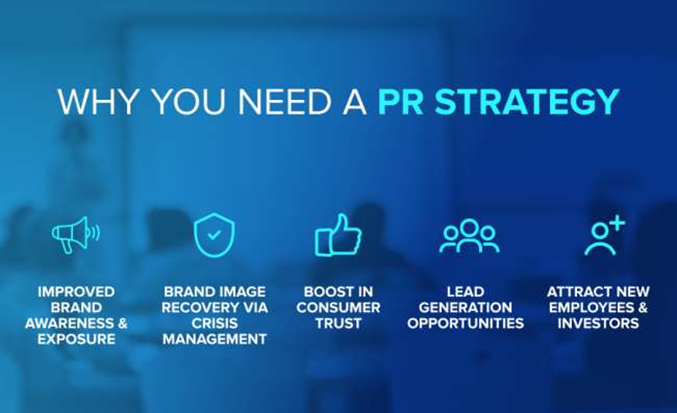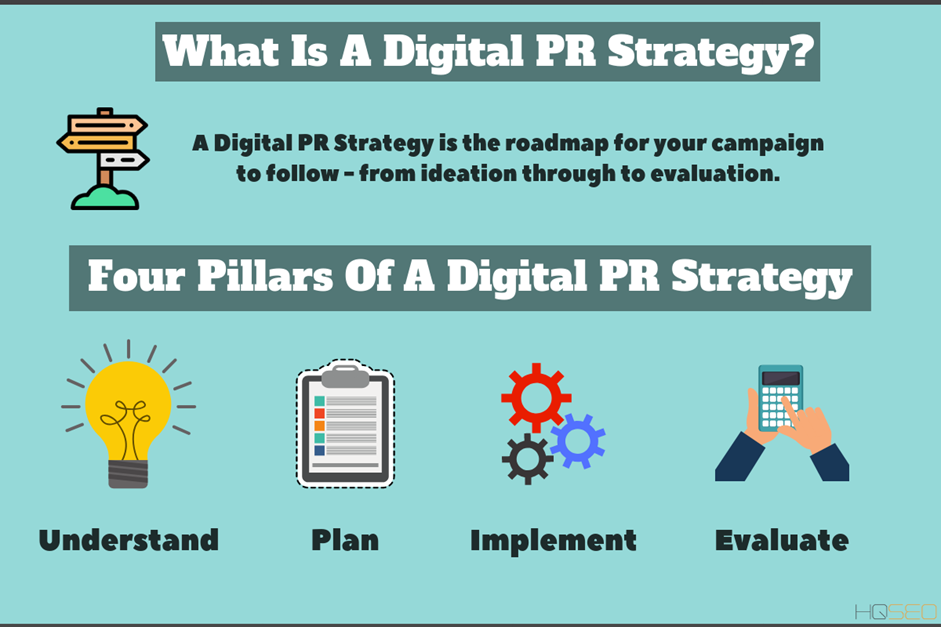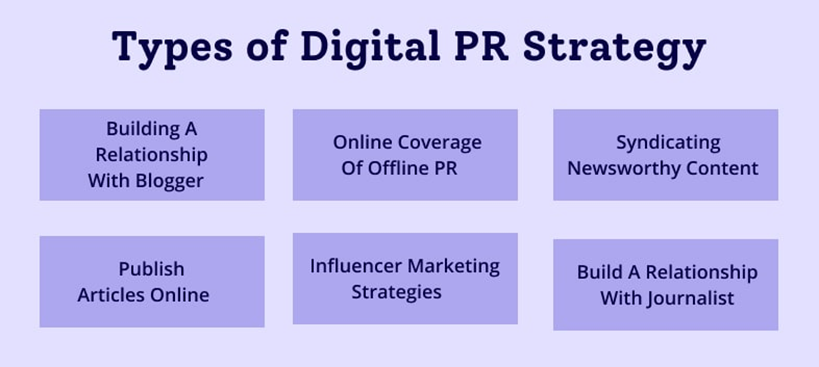
A public relations (PR) plan aids your company in organizing its public relations (or media relations) activities and making strategic decisions about how to interact with the audience. The creation and implementation of a PR strategy can help brands not only generate press interest in their products or services but also streamline their storytelling to appeal to various audience groups.
If a PR campaign strategy is properly implemented, it can be used to help control an organization’s public impression. The major benefit of a PR strategy is that it helps polish your brand image, and can even get you the attention of your desired audience.

A good PR strategy uses a variety of media outlets to advertise your company to raise public knowledge of your brand. Furthermore, amid a crisis, public relations is the most efficient strategy to control your communication and turn a negative situation into a positive one.
PR is also known as “earned media,” and it has multiple purposes for any brand. It can be used to increase website traffic, engage with target audiences, form meaningful connections, and promote brands in a more natural and trustworthy way. It’s critical to use media channels to attract more potential customers, while also raising brand recognition. If you want your brand to thrive, you simply cannot ignore the power of public relations.
Why Do You Need a PR Strategy?
Public relations campaigns aid in the development and maintenance of a positive public image for your company. Effective discussion is at the center of this mode of communication. It entails acquiring exposure to audiences through public-interest subjects and news stories.
Thousands of small- and medium-sized businesses across the world run public relations initiatives on a daily basis. Whether you’re a small business owner or a reputed entrepreneur, public relations will help you compete on a level playing field with your competitors.

To succeed in any competitive business environment in the modern world, apart from having a useful product, you also need to have great PR marketing strategies. Nowadays, conducting a business primarily involves how well you can manage your brand reputation. Therefore, today, for survival and success, any organization or corporation relies on its reputation.
Consumers, today, want to be able to trust the brands they buy from. They desire personalization and truthful messaging. This is why you should use the possibilities of a public relations strategy to become a trusted name in the industry. You should be aware of the advantages of public relations methods and how they may help your company get traction and reputation.
If done correctly, public relations can help you meet your marketing goals at a fraction of the price of expensive advertising. In PR, being creative with your messaging is crucial to your success. A well-thought-out public relations plan can help you achieve a range of objectives, including leadership development and crisis management.
In the long run, it may even help you build a strong foundation for your firm by establishing a degree of trust in the market. Customers are harder to impress these days, as they are more aware. When your product is mentioned in the media, consumers will value it more. Public relations is believed to have more credibility than advertising among internet customers. To succeed in the market, you’ll need a robust and solid public relations strategy.
11 Tips to Create a Successful PR Strategy

Public relations is frequently misunderstood as a marketing tactic. Despite their similarities, the two activities are fundamentally different. While public relations does not directly affect sales, it helps promote your business through positive word-of-mouth and sponsorships, among other things. This could improve your brand’s reputation in the long run, and possibly help you become a household name in your niche. Here are the top tips for creating effective PR campaign strategies.
1. Know your target customer
You must first analyze and categorize your viewers in order for your words to have the desired impact. Keep in mind that not every viewer is the same. Some people may be found at events, while others can be found on social media, and yet others can be found at networking gatherings. Your content, including press releases, should cater to your audience well.
2. Focus on research
In PR, there are no alternatives to thorough research. Because it helps you be strategic, research is an important aspect of public relations management. This guarantees that the message is delivered to people who desire, need, or understand the content. Examine public relations efforts that you’d like to emulate. Look at what your competitors are doing and consider how you can outsmart them. Research can help you find a lot about your brand and its place in the market.
3. Involve your team

To begin, you’ll need to assemble a dedicated team to handle your public relations activities. If you have someone on staff who is good at graphics, writing humorous content, or simply taking good photos, add them to your team. They will assist you in enhancing the value of your messaging, providing feedback, and assisting in the distribution of your messages. A team can assist you in ensuring that any communication you send is intentional rather than accidental. It helps ensure the brand sends out the correct message at all times.
4. Learn about your competition
Your company, as well as each department within it, must have a competitive advantage. A good strategy is built on the understanding, identification, creation, and maintenance of a competitive edge. Learning about your competition can also give you tons of other benefits, such as the option to outdo them in certain areas and even learn from their mistakes.
5. Create content that stands out
It is the goal of public relations to get the appropriate facts to the right people and at the right time. This contributes to the development of your brand and reputation. You must become fluent in your target culture, as well as their desires, likes, and dislikes. Choose a theme for your content that is appropriate. Curiosity, intensity, relevance, usefulness, and emotion should all be present in your content. Meaningful content gives your brand an edge over its competition.

6. Set quantifiable goals
Understanding what you really want to accomplish and how you plan to get there might help you focus your efforts. This will assist you in establishing which demographics you need to contact, as well as which messages and techniques are most likely to assist you in achieving your objectives. Setting goals for your brand also helps in building a positive attitude and hunger that fuels success in any company. Setting achievable goals for your brand in both the long and short terms is good for employee morale as well.
7. Pay close attention to your strategy
Choose the best public relations strategy for your company. You’ll need to know the difference between both public relations strategies as well as public relations tactics. General techniques for achieving goals are referred to as strategies. Tactics, on the other hand, are the day-to-day operations that a company carries out to execute each strategy. A working strategy helps you hash out a proper execution plan and give your brand a competitive edge in the market.
8. Use the reverse pyramid model
A press release is the cornerstone of any PR campaign. The ideal media release is nothing more than a series of cleverly veiled advertising posing as breaking news. If you phrase it in a way that it appears too promotional, the media may refuse to publish it. To begin with, compose it in a tone that is appropriate for the publication you are considering.
Write in an inverted pyramid manner to make things easier for journalists. The title should encapsulate the entire narrative, and each paragraph should provide a little more detail. This will reduce the amount of time it takes them to understand what your press release is about. Using upwards of 1,000 words is not recommended.
9. Have an online presence
For businesses, the web is a vital tool for spreading their message. People use the internet to find information and, in certain cases, control it. They’re on the lookout for something agreeable. If you tailor your SEO and appear prominently on search engines, you’ll likely attract a larger audience. This is also a good way to use digital PR to your advantage.
Choose your keywords with consideration, taking into account what your target viewers are likely to type into search engines. Also, be sure your material isn’t going to let you down. Digital PR is also useful in the modern era, where everyone wants to make purchases online and easily trust what they see on the internet.
10. Build a community
Nothing screams “community business” like a company that builds relationships. Participate in local events, cheer on your local football team, or network at a local fundraiser. Your stakeholders should be more than just passive beneficiaries of your public relations efforts; they should also be your partners. They can participate and be a part of the action. Indeed, the more involved stakeholders are, the higher their sense of ownership and commitment to you and the initiative. Consider the objectives of the stakeholders you’d like to bring in. Also, rather than dictating, attempt to identify common ground with them and cooperate with them.
11. Review last year’s PR strategy
A yearly evaluation of your company’s and rivals’ public relations campaigns is required to stay updated on the latest PR concepts and trends in the market. You will gain a better grasp of where you can develop. If you want to be well-known in your sector, you should understand which PR methods work and which do not, and that can only be learned by assessing your strategy on a yearly basis.
Key Takeaways
- A PR strategy is necessary for a brand to be a trustworthy name in any business.
- A great PR strategy gives you an edge over your competitors.
- Public relations strategies are different from branding and marketing.
- Reviewing your last year’s strategy can help you make improvements in your current one.
- If you are not utilizing the internet for PR, then you are missing out.
If used correctly, a PR strategy can help transform a brand’s image. There are many things you can do to increase your public relations, including keeping a check on your competition. Everyone may have a different approach to PR, but not adopting it at all can be dangerous for your brand. For your brand to be truly successful, you must build a community, which is possible if you utilize public relations correctly.
FAQs
Public relations might not have an immediate effect on your bottom line. But it is important if you want your brand to have a legacy and become recognizable. Marketing may help immediate sales, but PR helps in establishing your brand in the market and building a community.
The size of the company doesn’t really matter when it comes to maintaining public relations. Even if a small brand or a small-scale company has good public relations, then they have the potential to grow. If any company wants to see profits and loyal customers in their journey, they will have to consider sound digital PR strategies somewhere along the way.
The goal of PR is to provide your company with the best possible public image. This is accomplished through the development of relationships through media attention. It also diverts unfavorable attention away from the brand. Because consumers are aware that firms are paying for good advertising, they automatically limit their reaction to advertisements. Users are more willing to respond to a favorable reputation offered by an unbiased third party, i.e., when they encounter media recommendations of goods or services.
Using public relations instead of paid advertisements for publicity is more value for money. Take the time to send out press releases, give reporters interviews, and attend other media events. They’re a great way to get free exposure and promotion. Although it takes a little longer for PR strategies to produce results than commercials, they are a more effective instrument.
Latest Blogs
Explore how Google’s 2025 AI search updates triggered ranking chaos. Learn actionable strategies to adapt your SEO for AI Overviews, zero-click searches, and SERP volatility. Stay ahead now.
Learn how to rank on AI search engines like ChatGPT, Perplexity, and Gemini by optimizing your content for authority, structure, and relevance. Stay ahead in AI-driven search with this strategic guide.
Explore the best healthcare SEO services for your medical practice. Improve online visibility and effectively reach more patients in need of your services.
Get your hands on the latest news!
Similar Posts

B2C Marketing
5 mins read
Top Choices for Best Content Marketing Services in B2B Industries

Artificial Intelligence
5 mins read
How A Lead Generation Specialist Can Use AI-Powered Content Funnels to Drive Conversions

Artificial Intelligence
4 mins read